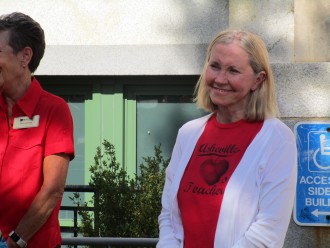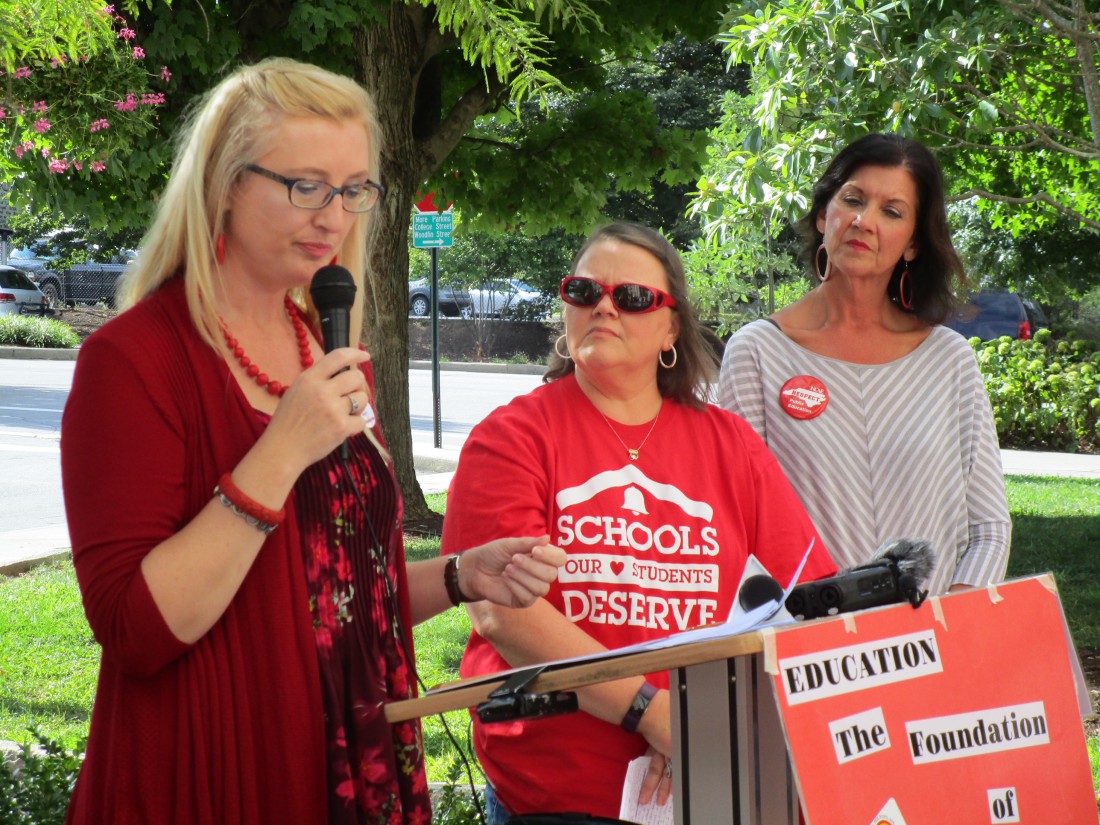On Aug. 24, just 48 hours before returning to the classroom, concerned teachers across the state gathered outside government buildings, pressing for more investment in public education.
The teachers, who make up the nonprofit Red4EdNC, are also looking ahead to the November elections.
“We have to elect people who will support public schools, who have a track record of supporting public schools and who are going to listen to teachers,” LeAnna Delph, a Red4EdNC advisory board member who teaches in the Buncombe County Schools system, said while facing the Buncombe County Courthouse.
In Asheville, about two dozen teachers and supporters donned red T-shirts and rallied outside the courthouse in solidarity. The press conference-style event, one of six statewide, echoed frustrations heard during a massive teachers march in May. Crowd estimates from that event range between 19,000 and 30,000 marchers on the state Capitol.
The long list of grievances put out by Red4EdNC includes outdated textbooks and inadequate support for students with special needs. Collectively, the problems largely stem from the state’s per-pupil spending, according to the advocacy group.
Total state funding per student in North Carolina is still lower than levels seen before the Great Recession, a decade ago. The latest figures from the National Education Association show total spending per student is about $9,528, compared with $11,934 nationally.
Stagnant wages, rising costs
The majority of school funding goes toward compensation. That’s one reason teachers say they’re feeling squeezed.
“While living and health costs have risen, my health care doesn’t cover what it needs to,” Angie Cathcart, a digital lead teacher at Asheville Middle School, said. Cathcart has taught in the public school system for nearly three decades but said she hasn’t seen a raise in six years. She said she often faces difficult choices, like whether to get her two cracked teeth fixed or to take her car in for repairs.
“The burnout is real,” she added.
Shari Edmisten, a music teacher in Catawba County, described the bleak state of affairs as it pertains to her classroom supplies.
“In 2004, the only textbooks in my class were from the 1980s. There were no funds allocated for my subject,” Edmisten said. So she spent $800 of her own money to purchase textbooks that she still uses today, Edmisten said.
“I attended a meeting last week, where a social studies teacher from Hickory said her textbooks have Barack Obama listed as a senator. Yeah, that’s old.”
As it turns out, teaching conditions are a strong predictor of teachers’ decisions about where to teach and whether to stay in their jobs.
The teacher turnover rate in the U.S. has risen from 5 percent in 1990 to about 16 percent today, according to a report by the Learning Policy Institute. That survey found the majority of teachers decide to leave their jobs for voluntary, nonretirement reasons. More than half cite dissatisfaction with working conditions.
In Asheville City Schools, the turnover rate among elementary and middle school teachers has exceeded state figures for the past three years. Following the 2016-17 school year, more than a quarter of the district’s middle school teachers left their positions, compared with 14.7 percent of middle school teachers statewide.
Edmisten says her own daughter is studying to become a teacher. But unlike her mother, she won’t be sticking around North Carolina.
“She’s looking into moving elsewhere, like Tennessee or Virginia. That’s not good,” Edmisten said. “We need the brightest and the best teachers, so what are we doing to recruit them?”
Pressure on Raleigh
Attendance was sparse outside the courthouse on the afternoon of Friday, Aug.24, at 5 p.m., notably an odd hour to hold a press conference. Children could be heard playing in the fountains nearby, and small flocks of tourists drifted around Pack Square.
Delph had invited local members of the N.C. General Assembly, but she says members of the House declined due to the last-minute special session on state constitutional amendments. The Senate was called to meet on Monday.
Nevertheless, Delph took attendance, calling each local lawmaker by first and last name.
“If you are present, would you please answer with your favorite subject in school,” Delph said.
She went through the list. Democratic Reps. Susan Fisher, John Ager and Brian Turner all were given “excused absences,” due to the special session.

Delph said Sen. Chuck Edwards, R-Henderson, responded to her invitation by email saying he had a prior commitment. Edwards, who was recently appointed to the state Joint Legislative Task Force on Education Finance Reform, did not return requests for comment on this story but said in a statement released Aug. 13, “In the short time that I have had the privilege to serve the citizens District 48, it has quickly become evident to me that the current method used to distribute funds to our education system needs work. It lacks transparency, is convoluted, and it is exceedingly outdated.”
After a pause, Delph continued. Terry Van Duyn?
“English,” Van Duyn, D-Buncombe, the lone North Carolina lawmaker, responded. She blended in with the group, wearing a red shirt bearing the script “Asheville Loves Teachers” across the front.
The Buncombe County state senator says she’s worried the lack of investment could undermine the region’s economic future.
“The companies I talk to, they tell me about the need for quality education because they say they want a well-trained, educated workforce,” Van Duyn said. “I’ve never had a business come to me and say, ‘My priority is cut my taxes.’”
Political calculations
North Carolina Republicans are quick to point out that they’ve consistently passed increases to teacher pay. Just this week, Senate Leader Phil Berger’s office put out a statement touting the Republican-led General Assembly’s approval of teacher pay increases since 2011, when the GOP took control of both the House and Senate. The most recent budget includes an average 6.5 percent pay increase.
“This is a success story, and we’re going to stay the course moving forward,” Sen. Majority Leader Phil Brown said in the statement emailed to media on Aug. 28.
Teachers with Red4EdNC dispute the efficacy of those raises, considering factors like inflation and higher costs of living. Teacher pay in North Carolina still ranks 37th in the country. The average salary this school year is an estimated $50,861, according to the NEA.
Regardless of how you measure success, it appears that school funding is at front and center of this year’s election.
While teachers have returned to the classroom, they don’t plan on keeping quiet. In addition to backing candidates who support increases to K-12 spending, Delph says, some teachers have their sights set on the statehouse.
She wouldn’t name specific candidates, but she gave a thinly veiled endorsement to those with teaching experience.
“There are very few teachers working in the General Assembly. We hope to elect a few more, so they know what they’re talking about,” Delph said.




sorry to read that any textbooks mention Obama… real American history is not being taught. that’s the best way to dumb down the population by not teaching American history.
have your government screwl children experienced teacher’s union ABUSE ?
Time for schools to modernize. School choice, internet, and other options exist.
Teachers expect a raise, What they don’t comprehend is many of us don’t get one.
Some people get to see the value of their houses double in a decade, which is how the economy works now in lieu of wage increases.
Maybe try joining a union?
LOL and if a home has added value, how does one realize it? I mean come on, that’s the dumbest rationale ever. You can’t keep raising taxes based on the VALUES and also claim they’re able to afford the increases due to ownership. If you want to go that route, then get rid of homestay rules and then you can raise taxes because the owners are actually earning money. Increases in tax values don’t. They take more money.
I wish I could have been present at this event. Teachers concerns are real and are focused almost entirely on student needs. We are badly underfunding the kids. Our schools need more social workers, counselors, school nurses, teacher assistants . . . and so on. Our State Constitution sets a high bar for support of our public schools. We need to keep reaching for that bar!